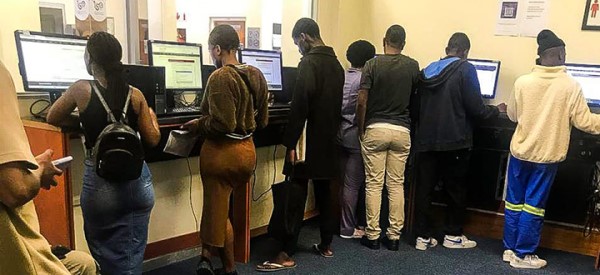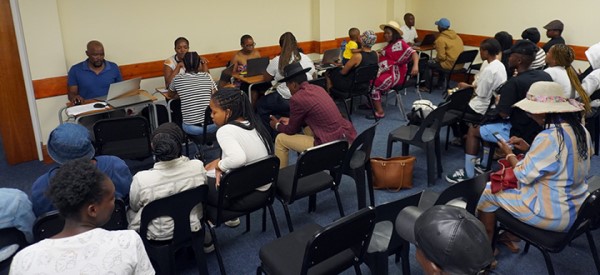Research
Student startup powered by Unisa’s DITTC revolutionises online examinations
What would you do if you lost internet connectivity 15 minutes before an online examination? This happened to Bonginkosi Mabaso in 2020 at the height of the Covid-19 pandemic.
"I was scheduled to write my final online examination to complete my Health Sciences and Social Services (Psychological Counselling) degree at Unisa. Fifteen minutes before the exam, I lost internet connectivity, which returned 25 minutes after the examination had started," says Mabaso.
Although he managed to write and submit his examination, he asked himself, "What are the chances that other students encountered the same challenge as I did?".

Ann-Connect company logo
Mabaso devised a groundbreaking, innovative solution to bridge the gap: Ann-Connect, an offline examination platform (OEP). An OEP ensures that students can stay connected for their online examination even when they lose internet connectivity. The offline platform is compatible with three devices: cell phone, computer and tablet.
The solution allows users to remotely access online information even when the connection fails without losing any required functionalities and features. Mabaso also founded a company by the same name (Ann-Connect).

Bonginkosi Mabaso
Ann-Connect is a technology company that provides innovative, offline networking solutions for individuals and organisations, specialising in solving connectivity issues caused by poor internet connections, technical glitches, load-shedding and blackouts. The company seeks to limit and eventually eliminate disruptions caused by losing connectivity to business processes.
The vision of Ann-Connect is not only to solve issues in the EdTech industry but also to tap into other potential industries to enable systems and users worldwide to stay connected – even without internet connectivity.
Mabaso, the founder and CEO of Ann-Connect, has the ambition to create differentiation in emerging ecosystems through value innovation.
"My interest in entrepreneurship was sparked by my mother, Nomsa Nyathi, who was an entrepreneur who sold clothes on the roadside in the villages," he says. "I saw the impact of her hard work at home and in the community. I would help her sell clothes during school holidays, and the lesson I received from the whole experience sparked entrepreneurship in me."
Startup supported through Unisa’s Startup Academy
Mabaso is in the Unisa Startup Academy, where the Directorate of Innovation, Technology Transfer and Commercialisation (DITTC) supports students and staff with developing their innovative ideas and assists them in establishing their startups. Furthermore, through the academy, he has been connected with like-minded individuals (ie entrepreneurs and innovators) – creating a space that inspires, encourages and fosters collaboration. Ayanda Noma, Director of DITTC, shared his enthusiasm at this success story: "I am very proud of Mabaso’s startup journey of small beginnings and seeing impactful contribution of DITTC."
Ann-Connect participated in various competitions through the Startup Academy. "We have won a prestigious award from the Blue Ocean Awards (BOA) held in Paris, France," said Mabaso. The BOA support package Ann-Connect is receiving involves access to the market, funding, mentorship and potential strategic partnerships.
"Unisa’s DITTC team has been an outstanding support system for Ann-Connect from the ideation phase to market validation," says Mabaso with gratitude. He says the support from the DITTC ensured that they validated their minimum viable product (MVP) with students from Unisa, the Tshwane University of Technology, the University of the Free State and Kearsney College.
In looking at his startup journey, Mabaso says, "From conceptualising Ann-Connect to validating its functionality internationally, will forever be a fulfilling, successful milestone in my startup journey".
Mabaso has been making waves in the media and has achieved the following accomplishments:
- He has been selected to be part of the UK Royal Engineering Academy programme among some notable academic innovators in South Africa.
- Ann-Connect has been selected as one of the best startups in the Emerging30 for the Young African Entrepreneurship Institute (YAEI) that is in partnership with Absa bank.
- He has piloted with Unisa’s Information and Communication Technology Department and College of Education.
- The examination platform has been showcased to five private distance learning institutions in South Africa, and Ann-Connect has managed to have two colleges interested in licensing the exam platform.
- Ann-Connect has secured its first client in South Africa.
- Ann-Connect has secured a total funding amount of R150 000 from the Innovation Challenge at Unisa, and this investment enabled Ann-Connect to build an offline invigilation app which will be launched soon.
- He has been interviewed on mainstream media, such as the Tech Africa segment of the SABC and TV BRICS.
To learn more about Ann-Connect’s stable offline connectivity exam packages, visit https://ann-connect.com/
* By Mpho Moloele, PR and Communications, Department of Research, Innovation and Commercialisation
Publish date: 2024/06/26

 Unisa co-hosts G20 community outreach in the Eastern Cape
Unisa co-hosts G20 community outreach in the Eastern Cape
 Unisans gain membership of prestigious science academies
Unisans gain membership of prestigious science academies
 Advocating for disability transformation through servant leadership
Advocating for disability transformation through servant leadership
 Unisa Press continues to illuminate the publishing space
Unisa Press continues to illuminate the publishing space